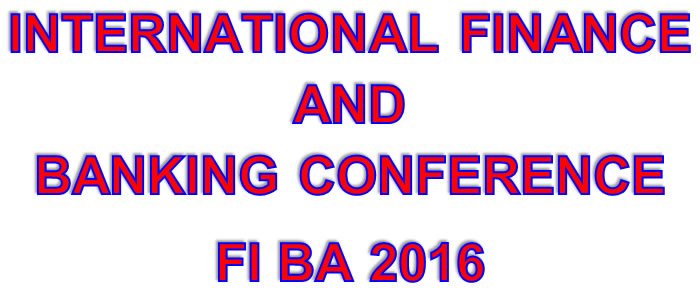
(XIV edition)
March 24-26, 2016, Bucharest, Romania
INFER supported event
Organized by:
FACULTY OF FINANCE AND BANKING
from Bucharest University of Economic Studies
in collaboration with
SIF BANAT-CRISANA
Romanian Association of Finance and Banking – RoFIBA
(Asociatia Romana de Finante-Banci – RoFIBA)
Center of Financial and Monetary Research (CEFIMO)
(Centrul de Cercetari Financiar-Monetare CEFIMO)
Papers accepted and presented at the International Finance and Banking Conference FI BA 2016 have been published in the supplement of the international review Theoretical and Applied Economics (ISSN 1844-0029(online edition)) .
The articles can be found at http://www.ectap.ro/ supliment/international- finance-and-banking- conference-fi-ba-2016-xivth- edition/26/
Some papers will be published in Economic Computation and Economic Cybernetics Studies and Research ( http://www.ecocyb.ase.ro ) and Review of Finance and Banking ( http://rfb.ase.ro /).
We are honoured to announce the conference keynote speakers:
 |
Professor
Paul WACHTEL, PhD. (New York University Stern School of Business) |
He teaches courses in monetary policy, banking and central banking, global macroeconomics and global perspectives. His primary areas of research include the relationship of financial development to economic growth, central banking in the post-crisis world, and financial sector reform in economies in transition. He has published widely in these areas; see http://pages.stern.nyu.edu/~pwachtel/ |
|
 |
Assistant Professor Peter CLAEYS (Vrije Universiteit Brussel) |
 |
Cordelius ILGMANN (Thuringian Ministry of Economic Affairs) Cordelius Ilgmann holds a Magister Artium degree in Modern History, Medieval History and Politics as well as a Bachelor and Master degree in Economics from the University of Muenster, Germany. From October 2008 he worked as a research assistant at the Center for Applied Economic Research at the University of Muenster where he received his doctorate (Dr. rer. pol.) in May 2011. In January 2012 he joined the Policy Department Banking Supervision at German Federal Supervisory Agency (BaFin). In March 2013, he moved to the Capital Market Division of the Federal Ministry of Finance in Berlin before joining the Single Supervisory Mechanism (SSM) at the ECB as member of the Crisis Management Division in June 2014. |
| Now, he is head of department for Economic Policy, Tourism and Digital Society at the Ministry of Economic Affairs in Thuringia. His research interests include History of Economic Thought, Institutional Economics and Law and Economics, with a focus on capital market and banking regulation. |
|